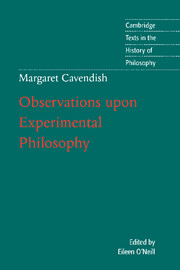Book contents
- Frontmatter
- Contents
- Acknowledgement
- List of abbreviations
- Introduction
- Chronology
- Further reading
- Note on the text
- Observations upon Experimental Philosophy
- To Her Grace the Duchess of Newcastle
- To His Grace the Duke of Newcastle
- To the Most Famous University of Cambridge
- The Preface to the Ensuing Treatise
- To the Reader
- An Argumental Discourse
- The Table of All the Principal Subjects
- Observations upon Experimental Philosophy
- Further Observations upon Experimental Philosophy
- Observations upon the Opinions of Some Ancient Philosophers
- Glossary
- Index
- Cambridge texts in the history of philosophy
Observations upon Experimental Philosophy
Published online by Cambridge University Press: 05 June 2012
- Frontmatter
- Contents
- Acknowledgement
- List of abbreviations
- Introduction
- Chronology
- Further reading
- Note on the text
- Observations upon Experimental Philosophy
- To Her Grace the Duchess of Newcastle
- To His Grace the Duke of Newcastle
- To the Most Famous University of Cambridge
- The Preface to the Ensuing Treatise
- To the Reader
- An Argumental Discourse
- The Table of All the Principal Subjects
- Observations upon Experimental Philosophy
- Further Observations upon Experimental Philosophy
- Observations upon the Opinions of Some Ancient Philosophers
- Glossary
- Index
- Cambridge texts in the history of philosophy
Summary
Of Human Sense and Perception
Before I deliver my observations upon that part of philosophy which is called experimental, I thought it necessary to premise some discourse concerning the perception of human sense. It is known that man has five exterior senses, and every sense is ignorant of each other; for the nose knows not what the eyes see, nor the eyes what the ears hear, neither do the ears know what the tongue tastes; and as for touch, although it is a general sense, yet every several part of the body has a several touch, and each part is ignorant of each other's touch: And thus there is a general ignorance of all the several parts, and yet a perfect knowledge in each part; for the eye is as knowing as the ear, and the ear as knowing as the nose, and the nose as knowing as the tongue, and one particular touch knows as much as another, at least is capable thereof: Nay, not only every several touch, taste, smell, sound or sight, is a several knowledge by itself, but each of them has as many particular knowledges or perceptions as there are objects presented to them: Besides, there are several degrees in each particular sense; As for example, some men (I will not speak of other animals) their perception of sight, taste, smell, touch, or hearing, is quicker to some sorts of objects, than to others, according either to the perfection or imperfection, or curiosity, or purity of the corporeal figurative motions of each sense, or according to the presentation of each object proper to each sense; for if the presentation of the objects be imperfect, either through variation or obscurity, or any other ways, the sense is deluded.
- Type
- Chapter
- Information
- Publisher: Cambridge University PressPrint publication year: 2001
- 33
- Cited by



